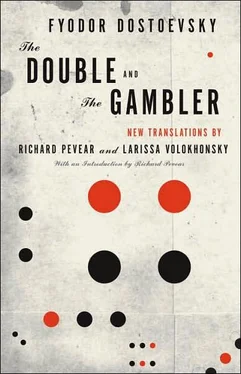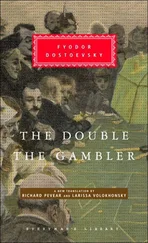Fyodor Dostoevsky - The Gambler
Здесь есть возможность читать онлайн «Fyodor Dostoevsky - The Gambler» весь текст электронной книги совершенно бесплатно (целиком полную версию без сокращений). В некоторых случаях можно слушать аудио, скачать через торрент в формате fb2 и присутствует краткое содержание. Жанр: Классическая проза, на английском языке. Описание произведения, (предисловие) а так же отзывы посетителей доступны на портале библиотеки ЛибКат.
- Название:The Gambler
- Автор:
- Жанр:
- Год:неизвестен
- ISBN:нет данных
- Рейтинг книги:4 / 5. Голосов: 1
-
Избранное:Добавить в избранное
- Отзывы:
-
Ваша оценка:
- 80
- 1
- 2
- 3
- 4
- 5
The Gambler: краткое содержание, описание и аннотация
Предлагаем к чтению аннотацию, описание, краткое содержание или предисловие (зависит от того, что написал сам автор книги «The Gambler»). Если вы не нашли необходимую информацию о книге — напишите в комментариях, мы постараемся отыскать её.
The Gambler — читать онлайн бесплатно полную книгу (весь текст) целиком
Ниже представлен текст книги, разбитый по страницам. Система сохранения места последней прочитанной страницы, позволяет с удобством читать онлайн бесплатно книгу «The Gambler», без необходимости каждый раз заново искать на чём Вы остановились. Поставьте закладку, и сможете в любой момент перейти на страницу, на которой закончили чтение.
Интервал:
Закладка:
Who is Mlle Blanche? Among us here they say she’s a French noblewoman, who goes around with her mother and has a colossal fortune. It is also known that she is some sort of relation of our marquis, only a very distant one, some sort of cousin or second cousin. They say that before my trip to Paris, contacts between the Frenchman and Mlle Blanche were somehow much more ceremonious, they seemed to be on a much more refined and delicate footing; while now their acquaintance, friendship, and family connection have emerged as somehow more coarse, more intimate. Maybe our situation seems so bad to them that they no longer find it necessary to be too ceremonious with us and to hide things. I noticed two days ago how Mr. Astley was studying Mlle Blanche and her mother. It seemed to me that he knew them. It even seemed to me that our Frenchman had met Mr. Astley previously as well. However, Mr. Astley is so shy, prudish, and reserved that one can virtually count on him—he won’t wash any dirty linen in public. The Frenchman, at any rate, barely greets him and almost doesn’t look at him; which means he’s not afraid of him. That’s understandable; but why is it that Mlle Blanche almost doesn’t look at him either? The more so as yesterday the marquis let something slip: in general conversation he suddenly said, I don’t remember on what occasion, that Mr. Astley was colossally rich and he knew it for a fact; and so Mlle Blanche might well look at Mr. Astley! The general is now thoroughly worried. It’s clear what a telegram about his aunt’s death could mean for him now!
Though it seemed certain to me that Polina was avoiding conversation with me, as if on purpose, I myself assumed a cold and indifferent air as well: I kept thinking she was just about to approach me. Instead, yesterday and today I turned all my attention predominantly to Mlle Blanche. The poor general, he’s utterly lost! To fall in love with such strong passion at the age of fifty-five is of course a misfortune. Add to that his widowerhood, his children, his completely ruined estate, his debts, and, finally, the woman he had to fall in love with. Mlle Blanche is quite beautiful. But I don’t know whether I’ll be understood if I say that hers is one of those faces that can be frightening. At any rate I have always been afraid of such women. She must be about twenty-five. She is tall and well built, with shapely shoulders; her neck and bosom are luxuriant; her complexion is a swarthy yellow; her hair is black as ink, and there is a terrible amount of it, enough for two coiffures. Her eyes are black, the whites are yellowish, her gaze is insolent, her teeth are very white, her lips always rouged; she smells of musk. She dresses showily, richly, with chic , but with great taste. Her feet and hands are astonishing. Her voice is a husky contralto. She sometimes bursts out laughing, and with that shows all her teeth, but usually she looks on silently and insolently—at any rate in the presence of Polina and Marya Filippovna. (A strange rumor: Marya Filippovna is leaving for Russia.) It seems to me that Mlle Blanche is without any education, is maybe not even intelligent, but instead is suspicious and cunning. It seems to me that her life has not been without adventures. If we’re to say all, it may be that the marquis is no relation of hers, and her mother is not her mother. But there is information that in Berlin, where we met them, she and her mother had some respectable acquaintances. As for the marquis himself, though to this day I have my doubts that he is a marquis, his belonging to decent society, as with us, for example, in Moscow, and in some places in Germany, does not seem open to doubt. I don’t know what he is in France. They say he has a château. I thought that in these two weeks a lot of water would have flowed, and yet I still don’t know for certain whether anything decisive has been said between Mlle Blanche and the general. Everything now depends generally on our fortune, that is, on whether the general can show them a lot of money. If, for instance, news came that grandmother hasn’t died, I’m sure Mlle Blanche would disappear at once. I find it astonishing and ridiculous, however, that I’ve become such a gossip. Oh, how disgusting this all is to me! With what pleasure I’d drop everyone and everything! But how can I leave Polina, how can I stop spying around her? Spying is mean, of course, but—what do I care!
I also found Mr. Astley curious yesterday and today. Yes, I’m convinced that he is in love with Polina! It’s curious and ridiculous how much the gaze of a prudish and painfully chaste man, touched by love, can sometimes express, and that precisely at a moment when the man would, of course, sooner be glad to fall through the earth than say or express anything with a word or a look. We run into Mr. Astley very often during our walks. He doffs his hat and passes by, dying, naturally, from the desire to join us. If he’s invited, he immediately declines. At resting places, in the vauxhall, at a concert, or near the fountain, he unfailingly stops somewhere not far from our bench, and wherever we may be, in the park, in the woods, or on the Schlangenberg—you need only raise your eyes, look around, and unfailingly somewhere, on the nearest path, or behind a bush, a little corner of Mr. Astley will appear. He seems to be seeking an occasion to speak with me privately. This morning we met and exchanged a couple of words. He sometimes speaks somehow extremely abruptly. Without even a “good morning,” he began by declaring:
“Ah, Mlle Blanche!…I’ve seen many women like Mlle Blanche!”
He fell silent, looking at me significantly. What he wanted to say by that, I don’t know, because when I asked him what it meant, he nodded with a sly smile and added: “Quite so. Is Mlle Pauline very fond of flowers?”
“I don’t know, I simply don’t know,” I replied.
“What? You don’t know that either?” he cried in great amazement.
“I don’t know, I simply never noticed,” I repeated, laughing.
“Hm, that gives me a particular thought.” Here he nodded and walked on. He looked pleased, however. We speak to each other in the most vile French.
CHAPTER IV
TODAY WAS A RIDICULOUS, outrageous, absurd day. Now it’s eleven o’clock at night. I’m sitting in my little room and remembering. It started with my having to go in the morning and play roulette for Polina Alexandrovna. I took all her hundred and sixty friedrichs d’or, but on two conditions: first, that I did not want to go halves, that is, if I won, I’d take nothing for myself; and second, that in the evening Polina would explain to me precisely why she has such a need to win and precisely how much money. I still can in no way suppose that it is simply for the sake of money. Money is obviously necessary here, and as soon as possible, for some particular purpose. She promised to explain, and I went. There was a terrible crowd in the gaming rooms. How insolent they all are, and how greedy! I pushed my way to the middle and stood right next to the croupier; then I began timidly to play, staking two or three coins. Meanwhile I observed and took note; it seemed to me that calculation meant rather little in itself and had none of the importance many gamblers attach to it. They sit with ruled sheets of paper, note down the stakes, calculate, deduce the chances, reckon up, finally place their bet, and—lose in exactly the same way as we simple mortals, who play without calculation. But, on the other hand, I drew one conclusion that seems to be correct: in the sequence of accidental chances, there is indeed, if not a system, at any rate the semblance of some order—which, of course, is very strange. For instance, it happens that after the twelve middle numbers come the twelve last ones; twice, let’s say, the ball lands on these twelve last ones, and then goes on to the twelve first. Having landed on the twelve first, it goes on again to the twelve middle numbers, lands three or four times on the twelve middle ones, then again goes on to the twelve last, from where again, after landing twice, it goes on to the first, lands there once, goes on to land three times on the middle ones, and so it continues for an hour and a half, for two hours. One, three, and two; one, three, and two. It’s very amusing. One day or one morning it goes, for instance, so that red alternates with black and vice versa, every moment almost without any order, so that the ball doesn’t land on the same color more than two or three times in a row. But the next day, or the next evening, it happens, for instance, that it lands on red alone up to twenty-two times in a row, and it’s sure to go on that way for some time—a whole day, for instance. A lot of this was explained to me by Mr. Astley, who spent the whole morning at the gaming tables, but did not stake once himself. As for me, I lost everything, and very quickly. I straight away staked twenty friedrichs d’or on evens and won, staked five and won again, and so it went two or three more times. I think about four hundred friedrichs d’or came into my hands in some five minutes. I should have walked away right then, but some strange sensation was born in me, some defiance of fate, some desire to give it a flick, to stick my tongue out at it. I placed the biggest stake permitted, four thousand guldens, and lost. Then, getting excited, I took out all I had left, staked it in the same way, and lost again, after which I left the table as if stunned. I didn’t even understand what had happened to me, and announced my loss to Polina Alexandrovna only just before dinner. The time till then I spent loitering in the park.
Читать дальшеИнтервал:
Закладка:
Похожие книги на «The Gambler»
Представляем Вашему вниманию похожие книги на «The Gambler» списком для выбора. Мы отобрали схожую по названию и смыслу литературу в надежде предоставить читателям больше вариантов отыскать новые, интересные, ещё непрочитанные произведения.
Обсуждение, отзывы о книге «The Gambler» и просто собственные мнения читателей. Оставьте ваши комментарии, напишите, что Вы думаете о произведении, его смысле или главных героях. Укажите что конкретно понравилось, а что нет, и почему Вы так считаете.












